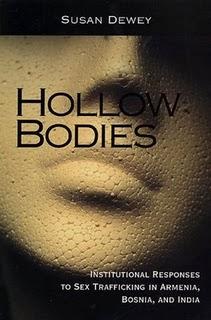Hollow Bodies: Institutional Responses to Sex Trafficking in Armenia, Bosnia and India

In Hollow Bodies, Susan Dewey travels to Armenia, Bosnia, and India to look at the institutional responses to sex trafficking in the three different cultural and governmental contexts. Armenia is plagued by poverty, unemployment and a poor quality of life that encourages migration. Bosnia is recovering from a violent war in which many women were victims of rape and forced into prostitution. However, unlike Armenia, its close proximity to Western Europe brings large amounts of donor aid and pressure to integrate with the West. Further east lies India, which receives little Western aid for trafficking issues. Therefore, its purpose in the book is to serve as an example of what can be done at a local level.
Dewey demonstrates her passion for the issue by telling her audience how her great-grandmother and grandmother survived the Depression by becoming prostitutes. This personal connection is felt throughout the text. Dewey’s greatest strength as a writer is her ability to bring the three different countries to life. In doing so, she notices the details of the landscape, the social structure of the setting and even utilizes private conversations to provide a useful context for the environment the women are operating within.
Her research mainly comes from her time as a volunteer consultant with the International Organization for Migration. Through her work with this multi-lateral association as well as through interviews with various policymakers, prostitutes and NGO leaders, she gives voice to the people involved in trying to reduce trafficking.
Dewey notes that institutions can fail to serve victims of trafficking. She is quick to criticize what bureaucrats, agencies and developmental programs do wrong, though she’s reluctant to point out what statistics she’s using to back up her claims. For instance, in the successful intervention she cites in India, she doesn’t provide impact or evaluation data, which leaves claims of effectiveness to be based solely upon subjective assessments.
Dewey admits approaching her research with a bias favoring prostitutes. Her emotional connection colors her discussions with bureaucrats and her critiques of their work loses force when she fails to address the policy aspects of trafficking or to suggest concrete changes that she thinks would improve upon current practices. Dewey’s suggestion that readers write to lawmakers to “refuse to support temporary U.S. funding initiatives that do not consider local needs and operate on a short-term basis that renders them unable to effect real or sustainable change” is insufficiently concrete. Why should US funding be permanent and how can this be achieved given the needs for benchmarks of effectiveness and our own political term limits? What type of local input should be collected and how? What is real and sustainable change? What specific goals should taxpayer dollars aim to achieve?
One of Dewey’s main criticisms is that programs fail to take into account the views of trafficking victims. Given that, the book could have benefited from more in-depth interviews of prostitutes in the three countries so that readers could gain a better understanding of what type of assistance these women would value and why.
Dewey appropriately highlights some of the failures of international institutions. She also presents a refreshingly honest portrait of the practical, ethical and personal difficulties a researcher can face. What is lacking is a more detailed picture of the women needing help and ideas of what specifically should be done to improve services to assist them.
Thanks very much for your review, Jessica. I warmly welcome comments and questions from interested readers. My email is susandewey@depauw.edu or susanrunkle@hotmail.com
Thank you, Jessica Jacobson, for reviewing this book and adding to the debate about this topic. These issues are near and dear to my heart, too, and I look forward to getting the book soon. I wonder if I could ask you what you mean by using the term "prostitutes." Is that the term that the author, Dewey, uses? Is it apt? I'm not suggesting that "sex worker" is inherently preferable, for sometimes that term is even more inappropriate. What about "prostituted women (and girls)." Would that fit a bit better, in terms of highlighting the nature of the relationships that bring them to sexual toil and the identities of the people (usually, not always, men).
I'd also like to learn more about what kinds of practical and ethical problems she faced as a researchers. What kinds of researcher methods did she use, by the way, and did she work in all three countries? Multi-sited ethnography about this kinda stuff is pretty rare.
Anyway, thanks again. Lawrence Hammar